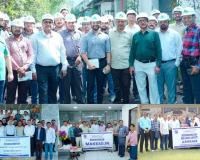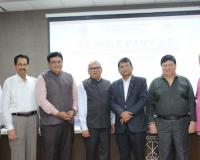Surat Textile Market Faces Transportation Dilemma Over Parcel Weight Regulations

In Surat, the textile capital, a significant discussion is underway regarding the transportation regulations imposed by local transporters. Recently, transporters announced a standard parcel weight limit of 65 kilograms, sparking concerns among traders from various markets who are now demanding an increase to between 70 and 75 kilograms. Despite agreeing to insure the parcels, traders voiced their discontent during a meeting held at the Raghukul Market Resolution Committee this Saturday.
The weekly meeting at Raghukul Textile Market, primarily a platform to address traders' concerns, particularly focused on the new weight and size regulations for transport parcels. Traders expressed that the new 65-kilogram limit would lead to logistical challenges and potential financial losses. They argued for a justifiable weight limit of 72 to 75 kilograms, stating that while they had no issues with insuring the shipments, the weight limit was not acceptable.
The 23rd session of this meeting also saw successful negotiations where suppliers managed to secure payments totaling INR 13.67 lakh over the past three weeks. However, the ongoing grievances about claim settlements related to lost or damaged parcels were also a major discussion point. Traders highlighted delays in receiving necessary documents from transporters, complicating the insurance claim process, often resulting in settlements that only partially cover the claimed amounts, sometimes as low as 35 to 60 percent of the value.
Rajeev Chiraniya, a local businessman, emphasized that while traders face numerous challenges, the imposition of higher costs would deter other state markets from engaging with them, potentially leading to financial burdens for local traders. He stressed the need for transport associations and trade organizations to consider these issues seriously and to ensure prompt and full settlement of claims within 30 days as per a written assurance.
Yuvraj Desle, head of the Surat Goods Transport Association, responded by clarifying that the legal responsibility for insuring parcels lies with the traders as per national regulations. He assured that in cases of unexpected incidents, transporters do file FIRs and provide a Non-Delivery Certificate, which helps traders claim their insurance. Occasionally, human errors might result in lost or stolen parcels, which are typically settled from a business standpoint.
As the discussion continues, the Surat textile market remains caught between adhering to new regulations and advocating for conditions that better suit their business needs.






